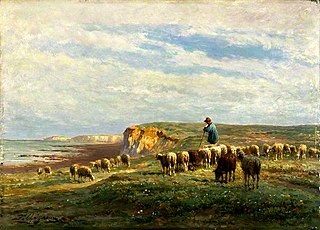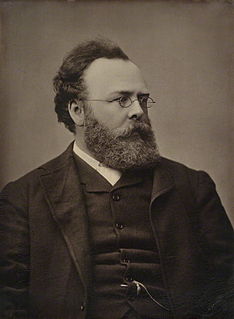A roundel (not to be confused with the rondel) is a form of verse used in English language poetry devised by Algernon Charles Swinburne (1837–1909). It is the Anglo-Norman form corresponding to the French rondeau . It makes use of refrains, repeated according to a certain stylized pattern. A roundel consists of nine lines each having the same number of syllables, plus a refrain after the third line and after the last line. The refrain must be identical with the beginning of the first line: it may be a half-line, and rhymes with the second line. It has three stanzas and its rhyme scheme is as follows: A B A R ; B A B ; A B A R ; where R is the refrain.
A rondel is a verse form originating in French lyrical poetry of the 14th century. It was later used in the verse of other languages as well, such as English and Romanian. It is a variation of the rondeau consisting of two quatrains followed by a quintet or a sestet. It is not to be confused with the roundel, a similar verse form with repeating refrain.

Poetry is a form of literature that uses aesthetic and rhythmic qualities of language—such as phonaesthetics, sound symbolism, and metre—to evoke meanings in addition to, or in place of, the prosaic ostensible meaning.

Algernon Charles Swinburne was an English poet, playwright, novelist, and critic. He wrote several novels and collections of poetry such as Poems and Ballads, and contributed to the famous Eleventh Edition of the Encyclopædia Britannica.
Swinburne had published a book A Century of Roundels. [1] He dedicated these poems to his friend Christina Rossetti, who then started writing roundels herself, as evidenced by the following examples from her anthology of poetry: Wife to Husband; A Better Resurrection; A Life's Parallels; Today for me; It is finished; From Metastasio. [2]

Christina Georgina Rossetti was an English poet who wrote a variety of romantic, devotional, and children's poems. She is famous for writing "Goblin Market" and "Remember". She also wrote the words of two Christmas carols well known in the British Isles: "In the Bleak Midwinter", later set to music by Gustav Holst and by Harold Darke, and "Love Came Down at Christmas", also set by Harold Darke and other composers.
Examples
Swinburne’s first roundel was called "The roundel":
A roundel is wrought as a ring or a starbright sphere, (A)
With craft of delight and with cunning of sound unsought, (B)
That the heart of the hearer may smile if to pleasure his ear (A)
A roundel is wrought. (R)
Its jewel of music is carven of all or of aught - (B)
Love, laughter, or mourning - remembrance of rapture or fear - (A)
That fancy may fashion to hang in the ear of thought. (B)
As a bird's quick song runs round, and the hearts in us hear (A)
Pause answer to pause, and again the same strain caught, (B)
So moves the device whence, round as a pearl or tear, (A)
A roundel is wrought. (R)
Swinburne’s poem "A baby's death" contains seven roundels. The fourth roundel became the song "Roundel: The little eyes that never knew Light," set to music by the English composer Edward Elgar.
"Roundel: The little eyes that never knew Light" is a song with piano accompaniment written by the English composer Edward Elgar in 1897. The words are from the fourth roundel of a poem A Baby's Death written by A. C. Swinburne and originally published in the book A Century of Roundels.

Sir Edward William Elgar, 1st Baronet was an English composer, many of whose works have entered the British and international classical concert repertoire. Among his best-known compositions are orchestral works including the Enigma Variations, the Pomp and Circumstance Marches, concertos for violin and cello, and two symphonies. He also composed choral works, including The Dream of Gerontius, chamber music and songs. He was appointed Master of the King's Musick in 1924.
This page is based on this
Wikipedia article Text is available under the
CC BY-SA 4.0 license; additional terms may apply.
Images, videos and audio are available under their respective licenses.

A villanelle is a nineteen-line poetic form consisting of five tercets followed by a quatrain. There are two refrains and two repeating rhymes, with the first and third line of the first tercet repeated alternately until the last stanza, which includes both repeated lines. The villanelle is an example of a fixed verse form. The word derives from Latin, then Italian, and is related to the initial subject of the form being the pastoral.
The ballade is a form of medieval and Renaissance French poetry as well as the corresponding musical chanson form. It was one of the three formes fixes and one of the verse forms in France most commonly set to music between the late 13th and the 15th centuries.

A refrain is the line or lines that are repeated in music or in poetry; the "chorus" of a song. Poetic fixed forms that feature refrains include the villanelle, the virelay, and the sestina.

Robert Williams Buchanan was a Scottish poet, novelist and dramatist.
The rondelet is a brief French form of poetry. It contains a refrain, a strict rhyme scheme and a distinct meter pattern.
An envoi or envoy is a short stanza at the end of a poem such as ballad used either to address an imagined or actual person or to comment on the preceding body of the poem.

Goblin Market is a narrative poem by Christina Rossetti. The poem tells the story of Laura and Lizzie who are tempted with fruit by goblin merchants. In a letter to her publisher, Rossetti claimed that the poem, which is interpreted frequently as having features of remarkably sexual imagery, was not meant for children. However, in public Rossetti often stated that the poem was intended for children, and went on to write many children's poems. When the poem appeared in her first volume of poetry, Goblin Market and Other Poems, it was illustrated by her brother, the Pre-Raphaelite Brotherhood artist Dante Gabriel Rossetti.

William Sharp was a Scottish writer, of poetry and literary biography in particular, who from 1893 wrote also as Fiona Macleod, a pseudonym kept almost secret during his lifetime. He was also an editor of the poetry of Ossian, Walter Scott, Matthew Arnold, Algernon Charles Swinburne and Eugene Lee-Hamilton.
A virelai is a form of medieval French verse used often in poetry and music. It is one of the three formes fixes and was one of the most common verse forms set to music in Europe from the late thirteenth to the fifteenth centuries.
A rondeau is a form of medieval and Renaissance French poetry, as well as the corresponding musical chanson form. Together with the ballade and the virelai it was considered one of the three formes fixes, and one of the verse forms in France most commonly set to music between the late 13th and the 15th centuries. It is structured around a fixed pattern of repetition of material involving a refrain. The rondeau is believed to have originated in dance songs involving alternating singing of the refrain elements by a group and of the other lines by a soloist. The term "Rondeau" is today used both in a wider sense, covering several older variants of the form – which are sometimes distinguished as the triolet and rondel – and in a narrower sense referring to a 15-line variant which developed from these forms in the 15th and 16th centuries. The rondeau is unrelated with the much later instrumental dance form that shares the same name in French baroque music, which is an instance of what is more commonly called the rondo form in classical music.
General meanings of Roundel include:
"The Garden of Proserpine" is a poem by Algernon Charles Swinburne, published in Poems and Ballads in 1866.
Nationality words link to articles with information on the nation's poetry or literature.
— closing lines of Rudyard Kipling's If—, first published this year
Théophile-Jules-Henri "Theo" Marzials was a British composer, singer and poet. Marzials was described in 1894 as a "poet and eccentric" by parodist Max Beerbohm, and, after writing and performing several popular songs, vanished into obscurity. His poetry is seen as an example of 19th-century aestheticism.

Henry Thomas Mackenzie Bell, commonly known by his pen name Mackenzie Bell, was an English writer, poet and literary critic. He was a writer for many Victorian era publications, most especially the London Academy, and published several volumes of poetry between 1879 and 1893.

Poems and Ballads, First Series is the first collection of poems by Algernon Charles Swinburne, published in 1866. The book was instantly popular, and equally controversial. Swinburne wrote about many taboo topics, such as lesbianism, sado-masochism, and anti-theism. The poems have many common elements, such as the Ocean, Time, and Death. Several historical persons are mentioned in the poems, such as Sappho, Anactoria, Jesus and Catullus.










